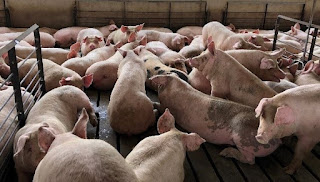The Western Cape Agriculture Department confirmed that African Swine Fever (ASF) has been detected in Thembalethu, George in the Southern Cape. ASF was also detected in KwaNonqaba outside Mossel Bay earlier in January.
According to the World Organisation for Animal
Health (OIE), ASF is a highly contagious haemorrhagic viral disease of domestic
and wild pigs, which is responsible for serious economic and production losses.
This transboundary animal disease (TAD) can be spread by live or dead pigs,
domestic or wild, and pork products; furthermore, transmission can also occur
via contaminated feed and fomites (non-living objects) such as shoes, clothes,
vehicles, knives, equipment etc., due to the high environmental resistance of
ASF virus.
The Western Cape’s State Veterinary Services
has served a quarantine notice on pig farmers in the area.
The quarantine notice urges community members
and pig farmers not to remove any pigs or pig products from the area to prevent
further spreading of the disease.
Agricultural MEC, Dr. Ivan Meyer urged pig
farmers to practise good biosecurity measures to ensure animal health and
safety.
"Farmers must practise good hygiene
management practices on their farms to minimise the risk of disease
introduction or spread of the disease through good biosecurity measures."
Provincial Head of Veterinary Services, Dr.
Gininda Msiza says the only avenue available to protect pigs is by establishing
a set of measures to reduce the risk of further spreading the disease.
"Carcasses should be disposed of safely,
pigs should be confined to prevent roaming and potentially the pick-up and
spread of the disease. Hands, shoes, clothing, and equipment must be sanitised
before and after contact with pigs, and meat products should be thoroughly
cooked before being fed to pigs."
Meyer thanked those farmers who take the
necessary precautions in mitigating the spread of ASF
"I want to thank those affected farmers
for minimising the possible negative impact on trade within the region and
sensitising pig farmers in other parts of the Southern Cape. This will help to
limit the spread of disease."
"My department will continue to monitor the situation. In addition, our State Veterinary Services will provide the necessary advisory services to prevent the further spread of the disease," added Meyer.

Comments